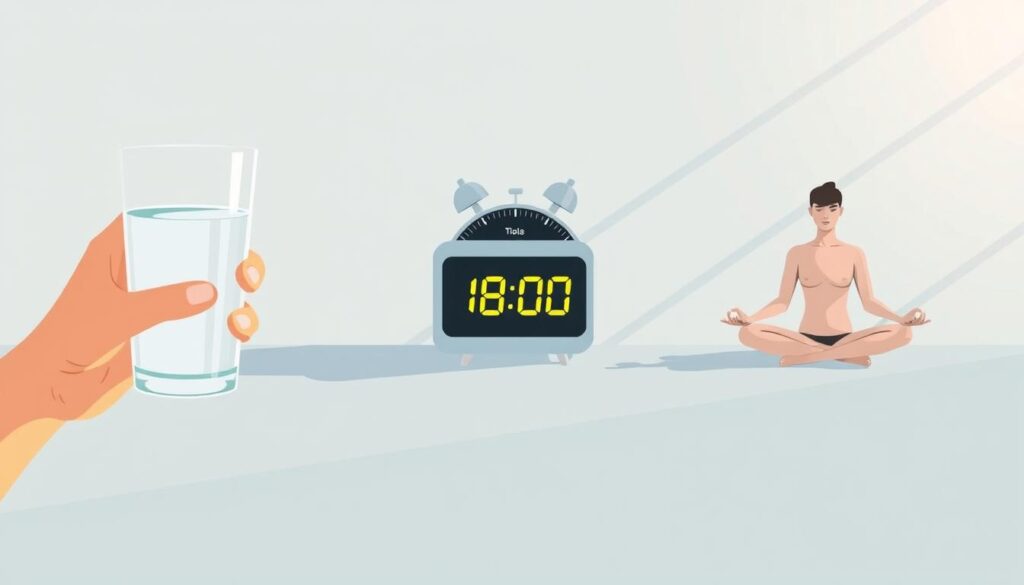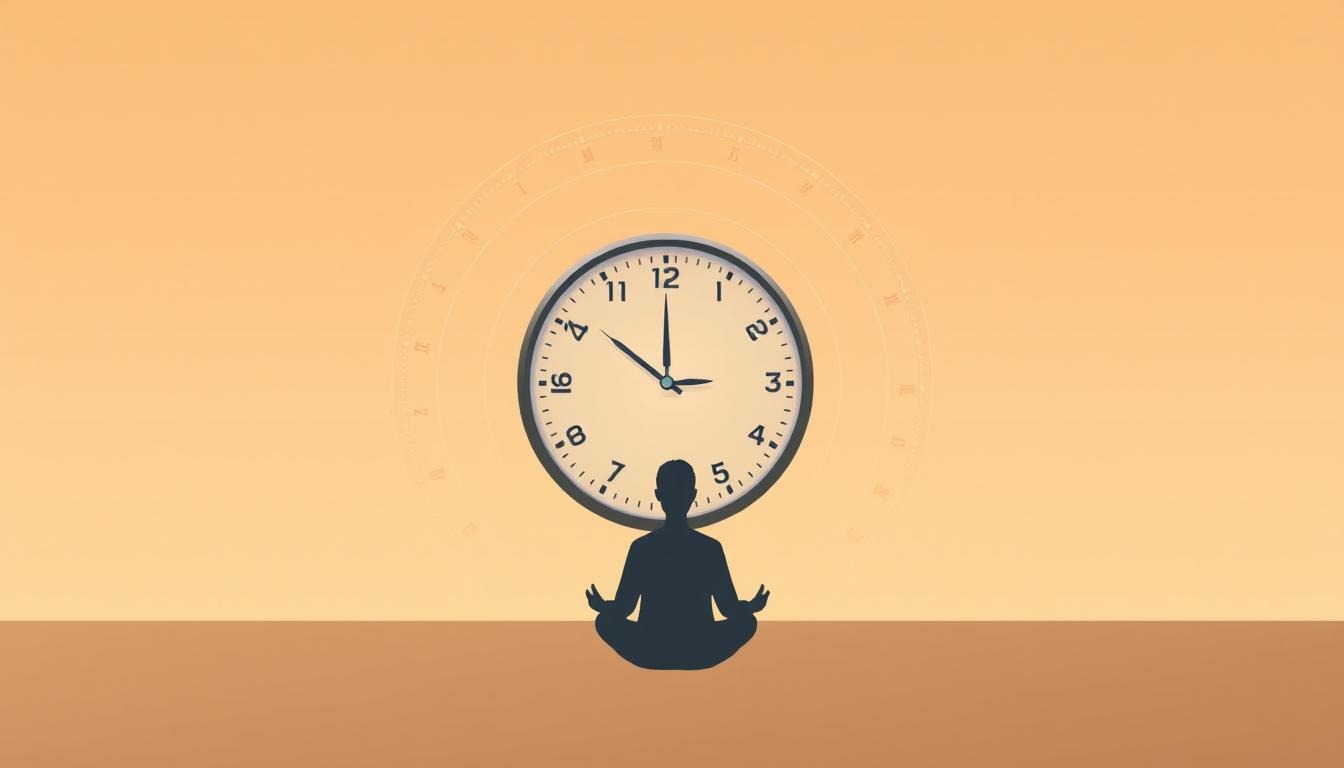Welcome to the world of intermittent fasting. It’s a new way to eat that’s getting popular everywhere. If you’re new, you’re in the right spot. Our guide will teach you the basics, benefits, and how to start.
Intermittent fasting is not just a diet. It’s a way to eat with fasting or calorie limits followed by free eating. We’ll look at methods like the 16:8 and 5:2 diets. You’ll learn how to pick the best one for you.
Key Takeaways
- Understand the basics of intermittent fasting and its benefits.
- Learn about different methods of intermittent fasting.
- Discover how to choose the best method for your lifestyle.
- Get tips on how to start your intermittent fasting journey.
- Explore the potential health benefits associated with intermittent fasting.
What is Intermittent Fasting?
Intermittent fasting means eating in cycles. You eat and then don’t eat for a while. It’s not a diet but a way to eat to get health benefits.
It’s popular for weight loss and improved metabolic health. By not eating all the time, your body gets a break. This can change your body in good ways.
Understanding the Basics
Intermittent fasting is about finding a pattern that works for you. You might fast for hours or eat very little on certain days. The goal is to find a rhythm that fits your life.
It’s very flexible. There are many ways to do it. You can choose the one that fits your needs and likes best.
Different Types of Fasting
There are many ways to do intermittent fasting. Here are some common ones:
| Fasting Method | Description | Potential Benefits |
|---|---|---|
| 16/8 Method | Fast for 16 hours, eat within an 8-hour window | Weight loss, improved insulin sensitivity |
| 5:2 Diet | Eat normally for 5 days, restrict calories to 500-600 on the other 2 days | Weight loss, reduced inflammation |
| Alternate-Day Fasting | Alternate between days of normal eating and days of complete or modified fasting | Weight loss, improved heart health |
Each method has its own good points and challenges. The most important thing is to find one you can keep doing for a long time.
Benefits of Intermittent Fasting
Intermittent fasting is more than just for losing weight. It also helps your body’s health and lowers the risk of serious diseases. This eating method can greatly improve your health and well-being.
One big plus of intermittent fasting is how it helps with weight loss and management. It limits when you can eat, which means you eat fewer calories. This leads to losing weight. It also helps your body use fat for energy instead of sugar, making your metabolism better.
Weight Loss and Management
Intermittent fasting helps you lose weight by cutting down on calories and boosting your metabolism. Dr. Jason Fung says, “Intermittent fasting is great for losing weight. It lowers insulin and boosts human growth hormone, helping you lose fat.”
Many studies show it works well. People lose a lot of weight and see better body shapes.
Improved Metabolism
Intermittent fasting makes your metabolism better. It makes your body more sensitive to insulin, lowers inflammation, and improves heart health. These are key to avoiding diseases like type 2 diabetes and heart disease.
Health Benefits Beyond Weight Loss
Intermittent fasting has many health perks, not just for losing weight. It includes:
- Improved insulin sensitivity
- Enhanced autophagy, which removes damaged cells and proteins
- Less inflammation, a big factor in chronic diseases
- More human growth hormone, helping with weight loss and muscle gain
A study in the New England Journal of Medicine found, “Intermittent fasting greatly improves metabolic health. It lowers the risk of chronic diseases.”
Getting Started with Intermittent Fasting
Starting intermittent fasting can feel hard at first. But, with the right steps, it’s doable. Remember, it’s a journey, not just a goal. It’s about changing how you eat for better health.
Choosing Your Fasting Schedule
First, pick a fasting plan that fits your life. There are many options. The most important thing is to choose one you can keep up with.
- Consider your daily routine: Pick a start time that feels right for you. If waking up early is hard, don’t start fasting then.
- Start with a less intense regimen: Beginners might do better with easier plans like 12/12 or 14/10. Then, you can try harder ones like 16/8.
- Be flexible: Finding the right plan might take some trying. Be ready to change your plan if needed.
Preparing Mentally for Fasting
Getting ready mentally is as key as picking a fasting plan. It’s about getting ready to succeed by knowing what to expect and how to handle tough times.
Understanding hunger: Hunger is only temporary. It usually gets worse on the second day. Knowing this helps you get through the hard parts.
Staying hydrated: Drinking lots of water is key during fasting. It helps with hunger and keeps you healthy.
By picking the right fasting plan and getting mentally ready, you’re on your way to success with intermittent fasting.
Common Intermittent Fasting Methods
There are many ways to do intermittent fasting. Each has its own good points and challenges. Knowing these can help you pick the best one for you.
Intermittent fasting is a big health trend now. People all over the world are trying different methods. Dr. Jason Fung says, “The key to successful fasting is not just about the type of fast, but also about consistency and listening to your body.”
“Fasting is not just about abstaining from food; it’s about giving your body a break from the constant process of digestion.”
The 16/8 Method
The 16/8 method means fasting for 16 hours and eating in an 8-hour window. It’s very popular because it’s easy to do. For example, skipping breakfast and eating between noon and 8 PM works well.
The 5:2 Diet
The 5:2 diet lets you eat normally for five days. Then, you eat only 500-600 calories on the other two days. It’s good for those who can’t fast every day.

Alternate-Day Fasting
Alternate-day fasting means fasting every other day. Some versions let you eat 500 calories on fasting days. Others say to fast completely. It’s tough but can help with weight loss.
Changing your diet or fasting plan is big. Always talk to a doctor first, especially if you have health issues.
Extended Fasting
Extended fasting lasts more than 48 hours. It’s for more experienced people. Make sure to drink water and listen to your body.
Learning about different fasting methods helps you make smart choices for your health. Whether you’re new or changing your plan, there’s a method for you.
What to Eat During Eating Windows
The foods you choose to eat during your eating windows can greatly affect your health and fasting results. It’s important to make smart food choices to get the most from intermittent fasting.
Healthy Food Choices
When you’re not fasting, eat foods that are full of nutrients. Whole foods like veggies, fruits, lean proteins, and whole grains are best. They give you the vitamins and minerals you need and help you feel full.
Avoid processed and high-sugar foods because they can make you feel tired and hungry. Choose foods with complex carbs, lean proteins, and healthy fats. They give you energy and help you stay healthy.
Hydration Tips
Drinking water is key, especially when fasting. Drink plenty of water all day, even when fasting. You can also eat foods like cucumbers, celery, and watermelon to stay hydrated.
Try to drink less caffeinated drinks and alcohol because they can make you dehydrated. Herbal teas and black coffee are okay during fasting, but watch how they affect you.
Sample Meal Plans
Having a meal plan helps you stay on track and get the nutrients you need. Here’s a simple example:
- Breakfast: Overnight oats with fruit and nuts
- Lunch: Grilled chicken salad with mixed greens, veggies, and citrus vinaigrette
- Dinner: Baked salmon with quinoa and steamed broccoli
- Snacks: Carrot sticks with hummus, apple slices with almond butter
Dr. Jason Fung, a fasting expert, says,
“The key to successful fasting is not just about restricting your calorie intake but also about nourishing your body during your eating windows.”
By eating whole, nutrient-rich foods and staying hydrated, you can get the most from intermittent fasting. Enjoy the many benefits it offers.
Potential Challenges and Solutions
Starting intermittent fasting can be tough. But, with the right tips, you can beat these challenges. Knowing these obstacles and how to solve them is key to fasting success.
Dealing with Hunger Pangs
Hunger pangs are common for beginners. Drinking lots of water helps. Eating foods rich in nutrients during your eating times also helps.
Eating foods high in fiber, lean proteins, and healthy fats makes you feel full longer.
Social Situations and Eating
Eating out and social events can be hard with fasting. Plan ahead. Adjust your fasting schedule for big events.
When eating out, pick healthy foods and watch your portions. Telling friends and family about your diet helps get their support.

Managing Energy Levels
Some people feel tired at first. This usually goes away. Make sure you sleep well and eat balanced meals.
Listen to your body and change your fasting plan if needed. If you’re always tired, try different fasting methods.
Knowing these challenges and how to tackle them makes fasting easier. The benefits, like losing weight and better health, are worth it.
Safety Precautions for Beginners
Starting intermittent fasting is exciting but safe is key. It helps with weight loss and health. But, it’s not for everyone.
Who Should Avoid Intermittent Fasting?
Some people should not try fasting because of health risks. These include:
- Pregnant or breastfeeding women, as fasting can deprive the fetus or baby of essential nutrients.
- People with a history of eating disorders, as fasting can exacerbate these conditions.
- Individuals with certain medical conditions such as diabetes, low blood pressure, or a history of heart disease.
- Those taking certain medications that require food intake.
If you’re in any of these groups, it’s vital to talk to a doctor before fasting.
Medical Considerations
Even if you’re not at high risk, think about your health. For example, people with diabetes must be careful. Fasting can change blood sugar levels.
Always talk to your doctor before starting fasting, especially if you have health issues.
Listening to Your Body
It’s crucial to listen to your body. If you feel dizzy, very hungry, or tired, you might need to change your fasting plan. Or, you might need to see a doctor.
- Notice how your body reacts at first.
- Be ready to change your fasting plan if you feel bad.
- Drink lots of water during fasting times.
By paying attention to your body and making changes, you can avoid risks. And you can enjoy the benefits of fasting.
Tracking Progress and Adjusting
To get the most from intermittent fasting, track your progress often. This means watching your weight and how your body reacts. By tracking, you can tweak your fasting plan as needed.
How to Measure Success
Success isn’t just about the number on the scale. Here are important things to watch:
- Weight Loss: Check your weight each week.
- Energy Levels: Note how you feel all day.
- Mental Clarity: See if you’re more focused.
- Overall Health Markers: Watch blood pressure and sugar levels.
Keeping a journal or using a mobile app helps track these. Regularly checking your data helps you make smart fasting choices.
When to Adjust Your Fasting Plan
If results aren’t what you hoped, it might be time to change your plan. Here are times to consider making changes:
- Insufficient Weight Loss: If weight loss is slow, try longer fasts or different eating times.
- Excessive Hunger or Fatigue: If you’re too hungry or tired, adjust your fasting or what you eat.
- Health Concerns: If health issues arise, talk to a doctor to change your plan.
Flexibility and patience are key to successful intermittent fasting. By tracking and adjusting, you can make your fasting plan work for you.
Frequently Asked Questions
Intermittent fasting can be a journey filled with questions. We’re here to answer some of the most common ones. Understanding these answers can make a big difference in your experience.
Is Intermittent Fasting Sustainable?
Many people wonder if intermittent fasting is sustainable. The good news is that it can be sustainable and maintainable for many. It offers flexibility in eating patterns, making it easier to follow long-term.
But, sustainability depends on several factors. The type of fasting you choose and how it fits your lifestyle are key. Choose a method you enjoy and can keep up with over time.
Can I Exercise While Fasting?
Exercising while fasting is a common question. The answer is yes, you can exercise while fasting. But, it’s important to listen to your body and adjust your workout intensity.
For beginners, start with light exercises like yoga or short walks. Then, gradually increase the intensity based on how your body feels. Remember to stay hydrated, especially when fasting and exercising.
What Should I Do if I Feel Dizzy?
Feeling dizzy or lightheaded during fasting can be a worry. It’s often due to dehydration or low blood sugar. If you feel dizzy, stay hydrated by drinking plenty of water.
For newbies, start with shorter fasting windows. Gradually increase the duration as your body adapts. This might help reduce dizziness.
Conclusion: Starting Your Journey
Starting an intermittent fasting journey can change your life for the better. It’s great for your health and happiness. As a beginner, it’s key to understand it well and stay positive.
New Beginnings
Starting out with intermittent fasting can feel hard. But with good advice and support, you can do it. Pick a fasting plan that works for you and pay attention to what you eat. This will help you succeed.
Embracing a Healthier Lifestyle
Intermittent fasting is not just a diet. It’s a way to live healthier. As you go along, you’ll learn about eating well and the freedom of fasting. Keep going, and you’ll reach your health goals.
FAQ
What is the best intermittent fasting schedule for beginners?
For beginners, the 16/8 method is great. You fast for 16 hours and eat in an 8-hour window. It’s easy and flexible.
Is intermittent fasting safe for everyone?
No, it’s not safe for everyone. People with diabetes or on certain meds should talk to a doctor first.
Can I drink water during intermittent fasting?
Yes, drinking water is key. You can also have black coffee or unsweetened tea while fasting.
How long does it take to see results from intermittent fasting?
Seeing results varies. It depends on diet, exercise, and starting weight. Some see changes in weeks, others take longer.
Can I exercise while intermittent fasting?
Yes, you can exercise while fasting. Exercise can boost fasting benefits. Just listen to your body and adjust your workout.
What are some common side effects of intermittent fasting?
Side effects include hunger, fatigue, and dizziness. These usually go away with time and proper hydration.
How do I manage hunger pangs during intermittent fasting?
Drink water, stay busy, and eat nutrient-rich foods during eating times. Adjusting your fasting schedule can also help.
Is it normal to feel weak or dizzy during intermittent fasting?
Yes, weakness or dizziness is common, especially at first. If it’s severe or lasts, see a doctor.




